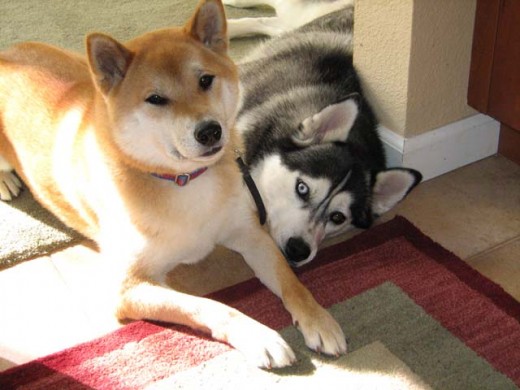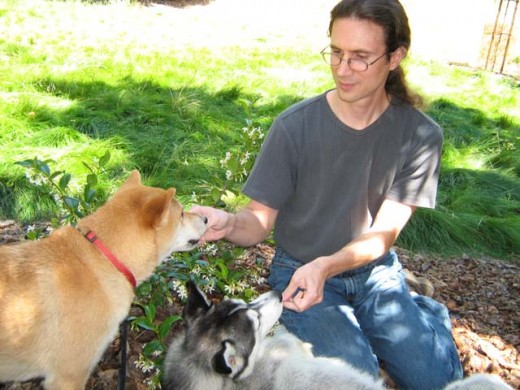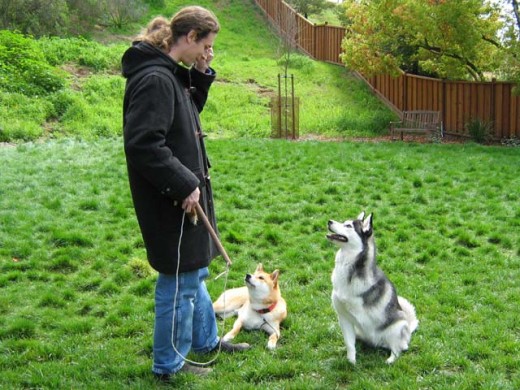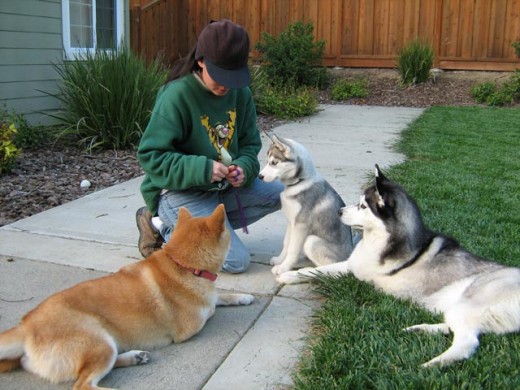Spanking, beating, and hitting a dog, is sometimes used as a form of dog discipline or dog punishment.
After all, biting a dog’s ear worked for Cuba Gooding Jr. in the movie Snow Dogs. Therefore, will such pain based techniques work for us too? To answer this question, we must consider how dogs learn.
Dogs learn through conditioning.
- They repeat behaviors that get them good results, and
- They stop behaviors that get them bad results.
Based on this, there are two schools of thought for stopping problem dog behaviors – reward obedience training and aversive obedience training.

Is It Bad to Beat or Hit a Dog?
Spanking, beating, and hitting a dog are all aversive techniques. Pain is delivered to sensitive areas of the dog, such as his ear or muzzle, when he performs a bad behavior.
The argument for this type of dog discipline, is that the pain will discourage a dog from repeating undesirable actions. Every time our dog does something bad, he gets an unpleasant result (pain), which will hopefully dampen his resolve to perform the same behavior.
However, the problem with aversive training, is that it is risky, too personal, and there is no good way to redirect the punishment.
Our dog knows that the pain originates from us, and is not a natural result of his actions.
As a consequence, our dog may end up learning the wrong lessons, including:
- Hitting, slapping, and biting is a fun game that my owner plays with me. Let me try playing it with him, and with others. A dog may arrive at this conclusion, when the pain is not delivered with enough force. Too much force, however, may result in fear aggression.
- A person’s hand or face coming toward me, is a bad thing. I should run away from people, or bite the hand or face that is a threat to me.
- My owner, or a person coming toward me, means pain. I should stay away from people, or keep them away by growling and biting.
If we do not deliver the pain with good timing, with the proper force, and in exactly the right circumstance, our dog may get confused as to why he is getting punished. He may become fearful and stressed, because he is unsure how he can stop the pain from recurring.
As a result, spanking, beating, and hitting a dog may lead to even more behavioral issues, including fear aggression as well as submissive urination.
For these reasons, using physical techniques to punish a dog, is not very good dog kung fu.

If Not Beating or Hitting a Dog, Then What?!
If beating or hitting a dog does not work, then how can we teach our dogs right from wrong?
How can we get our dogs to behave and not engage in destructive behaviors?
The answer lies in the other school of dog discipline, namely reward based techniques. Some positive based authors that I like include Patricia McConnell, Karen Pryor,
and Suzanne Clothier.
Contrary to what some may say, reward based methods does not just involve “giving food to our dog”. Rather, it allows us to gain pack leadership through the proper control of resources.


We may not realize this, but we already control all of our dog’s resources. For example, we decide when he gets to walk, when he gets to eat, what and how much he gets to eat, when he gets to play, what toys he gets to play with, when he has to go to sleep, what he can chew on, and much more. All we need to do, is teach our dog this fact –
He is NOT in control, WE are.
For example, if my dog jumps on me and bites my hand during feeding time, I tell him that this behavior is unacceptable, by using a no-mark. Then I ignore him, and he does not get his food, until he has calmed down. In this way, he learns that –
- Waiting calmly for his food in a down position = Get food quickly,
- Jumping and biting = Food preparation stops.
If he continues with his bad behavior, I say Time-out, and I remove him to a time-out area. This teaches him that if he cannot behave around people, then he does not get to be with people.
We respond to all other bad behaviors in a similar way – by restricting our dog’s access to his most desired resources, and only giving him rewards when he has earned them through good behavior.
Different dog behavioral issues will involve different tactics, but the overall strategy is one of resource control and proper management.

But Dogs Hit, Bite, and Physically Correct Each Other …
A common argument used to justify physical corrections, is that our dogs do that to each other, therefore, it must be natural and right.
It is true that dogs will sometimes hit and bite each other as a warning, or to correct behavior. Dogs also hit and bite during play. They are able to do this, because they have very good control of the placement and force of their bites.
However, dogs are not humans and *we* are not dogs. We do not have the same physical strengths or control as our dog. We do not have sharp teeth or claws, we cannot run very fast, and our jaws are not very strong.
This is why it is a very bad idea to physically challenge stray or loose dogs. Logic dictates that we do not wrestle, hit, or physically engage with unknown dogs, that may be aggressive. Similarly, we should not slap, beat, or hit our own dog either. Rather than do a bad job at pretending to be a dog, we should play to our human strengths.
As a human,
- We can open and close doors.
- We can drive to the store and buy food, toys, and other good stuff.
- We can open sealed bags, cans, bottles, and more.
- We can reason, build, and develop long-term plans.
In essence, our human abilities give us control of *all* the things that our dog needs or desires. This makes us into natural leaders, because by controlling the pack’s resources, we control the pack.

Finally, when a dog physically corrects another dog, the other dog may decide to fight back.
A puppy may allow an adult dog to correct him initially, but when he grows up, he may learn to respond in-kind with aggression. For this reason and more, I do not allow my dogs to physically correct or bully each other. As pack leader, I set the rules, and I enforce them through the control of resources. If there are any conflicts, my dogs will alert me. I will then do my best to resolve the conflict in a fair and consistent way, which does not involve any hitting, biting, or puncture wounds.
Just because a dog may sometimes hit and bite other dogs, does not mean that hitting and biting is good, effective, or even particularly humane. The assumption or assertion that physical punishment is better because our dogs do it, is a logical fallacy. In fact, there are many things that dogs do to each other and to other animals, that we need to manage, redirect, and retrain. This includes –
- A dog’s drive to hunt neighborhood cats,
- A dog’s instinct to guard resources (with aggression if necessary),
- A dog’s inclination to bully a weaker dog,
- A dog’s impulse to fight-back, and more.

Does Beating or Hitting a Dog Work?
Pain based techniques may stop problem behaviors in the short term, but it is not the most effective type of dog discipline.
There are many difficulties and risks that may cause our dog’s behavior to degrade, rather than improve. Using it to stop one problem behavior, may inadvertently cause five other bad dog behaviors to crop up. In addition, the effect of beating or hitting a dog may degrade over time, as our dog gets habituated to the pain.
In contrast, reward based methods are safer because there is little danger of our dog becoming fearful, aggressive, or stressed. We are not delivering any pain to him, but simply withholding the rewards that he has failed to earn.
- Reward based discipline encourages our dog to figure out how he can get in our good books, because that is the quickest way to get what he wants most.
- Aversive dog discipline, on the other hand, encourages a dog to avoid us because there may be pain involved.
Ultimately, resource based training allows us to forge a stronger bond with our dog, and makes him into a responsible canine, who works for what he wants.
The greatness of a nation and its moral progress can be judged by the way its animals are treated.
~~ [Mahatma Gandhi]


Hi there,
I have a 20 month old border collie x. She went to puppy school as a young pup and eventually stopped her terrible habit of running away (which is also dangerous as we live on a main road). She has recently (suddenly) started doing this again for no apparent reason. If the front door is left open she will take off up the driveway when in the past she was just happy to lie in the fresh air. She will not come back to us when called, we have to try and grab her and coax her back inside. It ends up being a bit of a stand off with her watching us – every step we take towards her, she steps away from us. She is walked daily, is well socialized, regularly talked to and played with. I am not sure what brought this on. Please help!
As I understand it, dogs often run out open doors because it is a self-reinforcing behavior. I.e. a successful escape rewards the dog very well with an interesting walk outside, where he gets to smell a lot of interesting things, chase squirrels and cats, meet new people, and have the freedom to go wherever he wants. Therefore, the more successful escapes a dog has, the more likely he will repeat the behavior, because each time he escapes, he gets rewarded with a really fun outing.
When my dog was young, he was less certain of himself, so he preferred to stay closer to home. As he matured, he gained confidence, and became less afraid of exploring farther afield.
For dog escapes, I teach my dog door manners, *and* I am also very careful about not leaving the door open unless I am there to supervise and have him on-leash.
For coming when called, here are a list of training techniques from the ASPCA. With my dog, I usually start recall training in a very low stimulus area, e.g. inside the house or my backyard. In this way, there are fewer competing external stimuli. After my dog is really good at coming when called in the backyard, then I *very slowly* increase the environmental challenge.
What is your pup’s routine like? How long are her daily walks? Border Collies have crazy energy, so they usually always have more energy to spare. 🙂
Hi I have a 3 month old border collie that will not stop biting me, my family, and my roommates kids. I don’t think he does it out of aggression, but he bites our hands while we try petting him. I do not hit him, but I’ve tried holding his muzzle closed, not paying him any attention, and putting him in time out. Nothing has stopped and it seems to be getting worse, especially around more people. I want to expose him to all sorts of people and things, but it’s getting difficult because of his biting. Suggestions please?
–Devin
As I understand it, dogs use their mouths to manipulate objects, similar to how we use our hands. It is instinctual for them to use their mouths to interact. A curious puppy will want to interact with and manipulate everything that he sees, so can be a lot of mouthing, especially when the puppy is excited.
Some things that I do with my puppy-
1. I manage her excitement level and only let her meet people when she is somewhat calm. If she gets too excited, we move away (using collar and leash), I get her to calm down, and we try again. In this way, I try to set her up for success.
2. I do bite inhibition training to teach her to control the force of her bites.
http://shibashake.com/dog/bite-inhibition
3. If she bites on me, this is what I do –
http://shibashake.com/dog/how-i-trained-my-husky-puppy#bite-training
More on what I do to keep my puppy calm and discourage biting.
Hi,
I have Shiba Inu and she is 13 weeks, two weeks ago she peed on the carpet and I hit her and took her to the backyard. I thought she will stop doing that but kept doing it and everytime she does it I punish her and take her to the backyard. Then she started to poop but in the kitchen when I am not around her, after couple of times she is now eat her poop as if she wants to hide what she did. How can I correct that? Is 13 weeks still too young to understand and to get hit or punished? I feel bad because I hit her and she started screaming and afraid she what I did might effect her personallity and become an aggresive dog and never listen to me and keep doing what she is doing.
In terms of potty training, I find that being calm and consistent are very important for my dog’s learning process. During the potty training period, I make sure to supervise my dog closely. I also set up a fixed schedule with consistent rules. In this way, I can better anticipate when my dog needs to go, and take him out during those times so that I can reward him very well, and reinforce the “potty outside” behavior.
At other times, I supervise him closely so that as soon as he looks like is he is about to go, I calmly take him outside. I reward him extremely well with food, play, and affection after he does his potty outside. Very quickly, he learned that potty outside is the right thing to do because it is so much more rewarding to do so.
Here is more on what I do to potty train my dog.
Here is more on how I train my puppy.
Study from UPenn on using physical corrections.
Hitting a dog as a form of discipline.
hiya we have recently got a 4month old labrador and he is a lovely dog and i love him to bits but i have never had a pup before and am finding it a little frustrating when trining him as he challenges me a lot like when im out walking him he constantly pulls i pull him back and also hold his mouth firmly but not hurting him and tell him no but then he keeps doing it so i keep persisting with what i am doing but he still keeps doing it its frustrating and i dont know if im dong right or not please help thankyou
Some of my experiences with leash training my dogs.
Is this to stop him from biting the leash or to stop him from play-biting with people?
Here is a bit more on how I trained my puppy.
More on how I teach my puppy not to bite on people.
Hi, I have a husky mix who is 3 years old and my boyfriend and I are having a hard time disciplining him. We tell him no and slap him and there are times where he growls and even snaps at us. My boyfriend is at his wits end with this, and as am I. We love him very much but need a way to discipline him and be safe about it. We have only had him for part of his life, we got him at a year and a half and he had less than basic training when we got him.
Given what you say, it is probably safest to get help from a professional trainer-
http://www.apdt.com/pet-owners/choosing-a-trainer/
Here is more on how I train my Husky.
Here is more on how dogs learn.
I also have all my dogs on the Nothing in Life is Free program.
I just got a new dog, and he isn’t that friendly with my poodle he is 1 year old shepherd. How can I make them get along?
Some things that I do to help my dogs get along.
I mean 6months
Hi I have a 1 year old mixed female dog and she seems to have a problem with where she should go to the bathroom. I have potty trained her already giving her set times of when she gets to go out and even when she gets to eat and she was doing just fine and then one of my siblings moved out so I moved into their room and it was like she turned into another dog. She will go to the bathroom in my room and in my room only even after I just took her out and she did potty when I took her outside not even minutes before the incident. I tried the method of putting her in timeout and even used her no word which is “bad”. But she just keeps doing it. It confuses me because she only does it in my room but never in any other room in the house. She’s never had a problem with this room before and I’m worried it’s me that’s doing something wrong. Please help…
Changes in routine and living conditions, can cause stress and confusion to the dog, which may cause changes in behavior or set-backs in potty training.
I *do not* use timeouts for potty training mistakes. When dogs poop or pee in the house, it is often because they are stressed, confused, or do not know that they are not supposed to go in a particular room.
If my dog is confused because of changes in environment or is still learning, then I calmly take her to where she is supposed to go, and then reward her extremely well for it so that she will be motivated to go there in the future. This teaches her where to go for her potty.
With potty training my dogs, I find that close supervision is the most important thing. I need to supervise my dog closely so that if she makes any mistakes, I can no-mark and take her out immediately. Then I can reward her very well for doing her business outside. The more I minimize mistakes inside and maximize successes outside, the more quickly my dog will learn what I want her to do.
If it is because of stress, then it is not really a potty training issue. I start by always being calm and patient with my dog, and try to identify what is the source of her stress, e.g. is it from being alone, is it from being in a particular place, is it because of my energy, etc. Once I identify the source of her stress, I can find ways to reduce her stress triggers, help her manage it, and help her stay calm through desensitization and counter conditioning.
Timeouts are often used to stop or discourage certain behaviors. Dogs have to pee and poop, so we do not want to discourage those behaviors, but simply to teach them where to do it.
Here is more on what I do to potty train my dogs. However, not all pooping and peeing in the house is the result of potty training. It can also be the result of stress, physical issues, and other factors.
When I try to change a particular behavior in my dog, the first thing that I do is try to understand why my dog is performing that behavior and what my end goal is. Once I understand these things, I can come up with a more effective plan for changing her behavior.
My Shar-pei/Boxer mix will be 1 year old in March. He is very hyper and does not listen to no, ignoring, or smacking. He constantly whines non-stop even if I had just fed him or took him outside. I will yell at him an say NO! but he just continues to do whatever he was doing. If I smack him on the nose he thinks I am playing with him, and sad to say I have honestly punched him (not THAT hard) but he still just sits there an whines or climbs on people. I am about ready to honestly get rid of him because I can’t even focus on my homework because of his constant whining and barking.
Any tips that will help me keep my dog will be greatly appreciated!
What I learned from my dogs is that their needs and tolerances are sometimes very different from mine. Therefore, in the beginning, they don’t know what my very human rules and preferences are. It is up to me to teach them these things, and to properly motivate them to learn and follow my rules.
I find that my dog learns best when I am calm and in control of the situation. If I get angry, stressed, or frustrated, my dog will pick up on my energy, get stressed himself, and his behavior will get even worse. I make the best progress when I stay calm and teach my dog that he gets what he wants most by first doing some simple work for me. This is also called the Nothing in Life is Free program.
Here is a bit more on how I trained my puppy.
In addition to setting up a fixed routine and teaching my dog a consistent set of rules, I also try to understand his needs and redirect his energy towards positive and productive activities. My dogs are all pretty energetic, so I take them out on walks every day, I play structured games with them, we do obedience and grooming sessions, and they also have supervised play sessions together.
Here is more on how I exercise my dogs.
Consulting with a good professional trainer can also be very helpful. I visited with several professional trainers during my difficult period with Sephy (Shiba Inu).
http://www.apdt.com/pet-owners/choosing-a-trainer/
Hi I have a year old malti poo and he barks when ever the door bell rings or at anyone who come home including my family members how do I get him to stop
http://shibashake.com/dog/woof-woof-stop-dog-barking